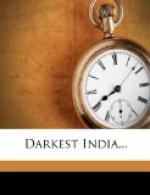For instance, supposing that a number of the destitute were employed in making coarse cloth, baskets, mats, or cow-dung fuel, these could be retailed at a nominal figure to those who presented our labour tickets at our food depots.
The most encouraging feature in the establishment of labour yards is that nearly every Indian has been brought up from childhood to some trade. You can rarely meet the most ignorant and uneducated Native without finding that he is thoroughly expert at some kind of handicraft. In brigading the poor we should be careful to make the best use of this knowledge by putting each as much as possible to the trade with which he was most familiar.
The following industries, the majority of them directly connected with various branches of our work, could be started at once and would need scarcely any outlay to begin with.
1. The Potters Brigade—Would furnish us with the earthenware, for which we should from the first have a very large demand. The Household Salvage Brigade would require some thousands of pots to start with and in connection with our food depots we should be able to dispose of thousands more.
2. The Weavers Brigade—This would give employment for a large number of skilled hands. Their first object would be to supply the kinds of clothes, blankets, &c., which would be most suitable for the use of the submerged tenth. In catering for their wants we should avoid, however, anything prisony, or workhousey, or charity-institutiony in appearance. As our numbers increased we should find plenty of work for our weavers, at any rate for many years to come without entering into any sort of competition either with the market or the mills.
3. The Basket Brigade—Would
supply us with all sorts of cheap
baskets, for which we should
have a constant demand.
4. The Mat Making Brigade—Would
find employment for many more
hands in supplying us with
mats for sleeping and household purposes.
5. The Fuel Brigade—Here we have an industry which requires no skill. There would be two branches of it—the woodchoppers and the Oopala makers. For the latter women and children could be largely employed both in the collection of the cow-dung and in the preparation of it for use as fuel.
6. The Tinners Brigade—Will
be kept busy making receptables and
badges for the Salvage Brigade,
and also probably emblems for the
Labor Bureau.
7. The Ropemakers Brigade—Will
furnish employment to a number
more and the results of their
labour will find an ample market in
our various colonies.
8. The Tanners Brigade—Will
supply all our departments with such
leather as may be required
for various purposes, and among other
things will be attached to.




